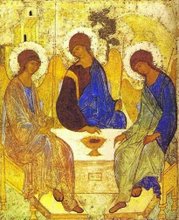It is said that a people's values can be seen in the god they worship. For Christians, ``God is love'' (1 Jn 4:8). But a God who is love seems like a philosophical impossibility. How can one God, who is perfect, lacking nothing in himself and possessed of no dependence on creatures, be love when love necessitates a relation to another?
The resolution of this paradox God himself has revealed to us: God is perfect unity, but a unity of three Divine Persons-- Father, Son, and Holy Spirit-- who are each equally divine. The Father, Son, and Spirit exist from all eternity. None precedes the other in time, but each are related to the others by a relationship that orders them with respect to the others.
The ever-living, all-knowing, almighty God the Father exists from all eternity and is the source of all perfection created and uncreated. The self-conception and self-expression of the perfect Being is so complete that it is another person: God the Son, the image of the invisible Father, ``the only-begotten Son of God, begotten from the Father before all the ages, light from light, true God from true God, begotten not made, consubstantial with the Father, through whom all things came to be'' (Nicene-Constantipolitan Creed). The love between the Father and the Son is so perfect that it too is another person: the Holy Spirit ``the holy, the lordly and life-giving one, proceeding forth from the Father [and the Son], co-worshipped and co-glorified with Father and Son'' (ibid.).
But if the Holy Spirit is the love between the Father and the Son, how can God as a whole be called Love? Each person shares equally in the divine nature, so that each person shares equally in the perfections of the others. The only distinction between the persons of the Trinity is their mutual relations. None of the persons exists in respect to himself alone, but each exists relatively to the other two:
...the ``three persons'' who exist in God are the reality of word and love in their attachment to each other. They are not substances, personalities in the modern sense, but the relatedness whose pure actuality... does not impair unity of the highest being but fills it out. St Augustine once enshrined this idea in the following formula: ``He is not called Father with reference to himself but only in relation to the Son; seen by himself he is simply God.'' Here the decisive point comes beautifully to light. ``Father'' is purely a concept of relationship. Only in being-for the other is he Father; in his own being-in-himself he is simply God. Person is the pure relation of being related, nothing else. Relationship is not something extra added to the person, as it is with us; it only exists at all as relatedness.
....the First Person [the Father] does not beget the Son in the sense of the act of begetting coming on top of the finished Person; it is the act of begetting, of giving oneself, of streaming forth. It is identical with the act of giving. (Joseph Ratzinger Introduction to Christianity, pp. 131-132; cf. Augustine, Enarationes in Psalmos 68; De Trinitate VII, 1, 2.) Each of the persons of the Trinity lives completely for the others; each is a complete gift of self to the others. The complete self-giving not only constitutes the individual persons of the Trinity, but also their inseparable oneness.
Thus, for Christians the very basis of all reality is the loving communion of persons that is the Holy Trinity.
- Augustine Club@columbia.edu
Friday, July 25, 2008
The Most Holy Trinity: a Union of Love
Labels:
Communion,
God,
Holy Trinity,
Love,
Person,
The Father,
the Holy Spirit,
The Son
Subscribe to:
Post Comments (Atom)



No comments:
Post a Comment